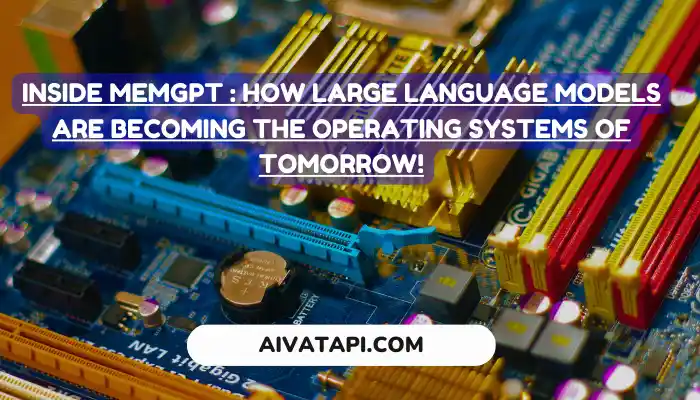Explore the revolutionary concept of MemGPT, a system treating large language models as operating systems. Discover how it intelligently manages memory, extending context within limited windows. Dive into the MemGPT project, its evaluation in document analysis and multi-session chat. Uncover the future of LLMs as dynamic, self-evolving conversational agents.
Introduction: In a recent breakthrough, MemGPT has emerged as a game-changer, redefining how large language models (LLMs) operate. This article delves into the core concepts of MemGPT, exploring how it transforms LLMs into sophisticated operating systems that adeptly manage memory. We’ll unravel the intricacies of this revolutionary approach, its applications, and the impact it holds on the future of conversational agents.
Inside MemGPT: How It Works
MemGPT Architecture Overview:
MemGPT introduces an innovative system for managing different memory tiers, providing extended context within the LLM’s limited context window. This groundbreaking approach involves the use of interrupts to control the flow between MemGPT and the user.
Virtual Context Management:
One of MemGPT’s key features is its creation of a virtual context management system. This system includes a main context analogous to RAM and an external context similar to secondary memory. Learn how MemGPT seamlessly swaps information between these contexts, allowing LLMs to handle memory autonomously.
Working Context and Memory Update:
Explore the working context within MemGPT, which acts as a working memory scratch pad for the agent. Witness how MemGPT updates its memory dynamically during interactions, allowing it to evolve and adapt to user inputs.
MemGPT in Action: Real-world Applications
Document Analysis:
MemGPT’s prowess shines in document analysis, where traditional LLMs struggle with limited context windows. Discover how MemGPT can analyze large documents, surpassing the constraints of underlying LLMs.
Multi-Session Chat:
In the realm of multi-session chat, MemGPT excels at creating conversational agents that remember, reflect, and evolve through long-term interactions. Witness the transformative power of MemGPT in reshaping the landscape of dynamic conversations.
Evaluating MemGPT’s Performance
Deep Memory Retrieval Benchmark:
To assess MemGPT’s performance, a new benchmark called “Deep Memory Retrieval” was introduced. Understand the intricacies of this benchmark and how MemGPT outperforms other models in tasks related to deep memory retrieval.
Limitations and Future Directions
Dependency on GP4 API:
While MemGPT showcases remarkable capabilities, it currently relies on the GP4 API for optimal performance. Explore the limitations associated with this dependency and potential future directions for broader applicability.
FAQs (Frequently Asked Questions)
Q: How does MemGPT handle long-term interactions in multi-session chats?
A: MemGPT excels at creating conversational agents that remember, reflect, and evolve dynamically through long-term interactions, ensuring a rich and personalized user experience.
Q: Can MemGPT analyze documents larger than the typical LLM’s context window?
A: Yes, MemGPT demonstrates exceptional document analysis capabilities, efficiently handling large documents that surpass the limitations of traditional LLMs.
Q: Is MemGPT only effective with the GP4 API, or are there plans for broader compatibility?
A: Currently, MemGPT’s optimal performance relies on the GP4 API. However, there are considerations for enhancing compatibility with other models in the future.
Q: How does MemGPT ensure data privacy and security during memory management?
A: MemGPT follows rigorous protocols to ensure data privacy and security, adhering to industry standards and best practices in memory management.
Q: Can MemGPT be fine-tuned for specific applications or industries?
A: Yes, MemGPT’s architecture allows for fine-tuning to cater to specific applications or industries, making it a versatile solution for various use cases.
Q: What distinguishes MemGPT from traditional LLMs in terms of memory management?
A: MemGPT introduces a virtual context management system, allowing LLMs to autonomously manage memory with different tiers. This innovative approach sets MemGPT apart in terms of memory handling.
Conclusion:
As we navigate the landscape of large language models, MemGPT emerges as a groundbreaking force, propelling LLMs into the realm of operating systems. The ability to intelligently manage memory, handle long-term interactions, and excel in diverse applications positions MemGPT at the forefront of conversational AI. This article has unveiled the architecture, applications, and future possibilities of MemGPT, marking a significant stride towards the evolution of language models into the operating systems of tomorrow.





